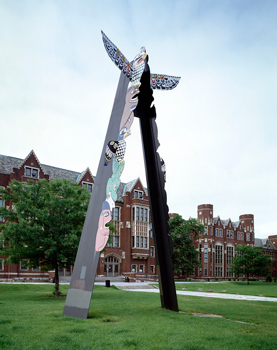Old myths, old gods, old heroes have never died. They are only sleeping at the bottom of our mind, waiting for our call. We have need for them. They represent the wisdom of our race.
—Stanley Kunitz, former U.S. Poet Laureate

Source: “Ignorance to Wisdom,” a totem sculpted and painted by Lane Technical High School teachers and students, Chicago, Illinois, photo by Carol Highsmith, Library of Congress
Have you ever had a feeling of déjà vu while reading a story, but you are sure you have never read that story before? If so, you are not alone. Psychologist Carl Jung theorized that humans have a “collective unconscious” made up of experiences and ideas that we inherit from our ancestors. We are unaware of this unconscious, but it somehow influences how we see the world.
Jung came up with his theory to explain why we sometimes instantly recognize characters and situations in myth and literature. He believed that this collective unconscious contained archetypes. An archetype is a model image, personage, or theme that recurs in stories and myths throughout history and literature.
When you study a foreign language and begin to read the literature of that country, you will often discover stories that seem familiar to you as a reader of English. That’s because archetypes cross countries and cultures, and you can discuss archetypes with people in different countries and cultures around the world. Some stories from different cultures are familiar to us even when we know little or nothing about those cultures. Having similar stories in common supports Jung’s theory that we are all connected in some unconscious way.
Understanding mythology, archetypes, and motifs can help you as you read; having this knowledge not only gives you a better understanding of the story you are reading but also an understanding of other countries and cultures. If you know you are reading a story filled with certain archetypes, you might know the direction the story will take before you get there. Your knowledge might cause you to think more deeply about a story you’re reading or a play or film you’re watching. You might even ask more questions as you read. In this lesson, you will learn more about archetypes and motifs, and you will write a scene from a play, incorporating what you have learned into your scene.